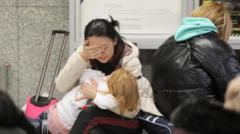With mounting anti-Ukrainian sentiment, Ukrainian refugees in Poland are experiencing rising instances of bullying and discrimination, a shift contrasted with the initial warmth shown at the beginning of the war.
Rising Anti-Ukrainian Sentiment in Poland Poses Challenges for Refugees

Rising Anti-Ukrainian Sentiment in Poland Poses Challenges for Refugees
As the political climate shifts, Ukrainian refugees in Poland report increased discrimination and abuse amidst changing public opinions.
In recent months, Ukrainian refugees in Poland have encountered alarming levels of anti-Ukrainian sentiment, with many reporting experiences of abuse and discrimination. Svitlana, a Ukrainian mother whose daughter previously found solace in her Polish school, lamented the sudden change as her child faced bullying and hateful remarks such as "Go back to Ukraine." This growing hostility has been exacerbated by a contentious presidential election campaign that has polarized public opinion.
On public transport and in schools, Ukrainian refugees have increasingly reported instances of bullying and xenophobic behavior. Svitlana revealed that her daughter was mocked for speaking Ukrainian, coming home in tears after experiencing ridicule tied to a recent tragedy in their hometown. The trauma of war compounded by such bullying has led many Ukrainian families to consider returning home, fearing worsening acceptance in Poland.
According to government statistics, approximately 2.5 million Ukrainians make up nearly 7% of Poland's population. Initially, the Polish response to the war was marked by compassion, with many citizens rallying to support refugees. However, recent trends point to a disturbing decline in acceptance; a CBOS poll reported that only 50% of Poles currently support Ukrainian refugees, a significant drop from 81% two years ago.
The political landscape in Poland further complicates the situation. Candidates like Slawomir Mentzen advocate openly anti-Ukrainian policies, while front-runner Rafal Trzaskowski has shifted away from strong pro-Ukrainian rhetoric in response to changing public sentiment. Meanwhile, disinformation campaigns from pro-Russian sources appear to fuel negative perceptions of Ukrainians, with narratives suggesting that refugees burden the Polish economy.
Experts warn that the ripple effects of anti-Ukrainian sentiment may become more pronounced after the elections, given current political dynamics. Michal Marek, an NGO leader, highlighted how propaganda linking Ukrainians to theft and violence could shape voter behavior, making it crucial for the welfare of Ukrainian refugees to monitor the evolving political climate closely.
On public transport and in schools, Ukrainian refugees have increasingly reported instances of bullying and xenophobic behavior. Svitlana revealed that her daughter was mocked for speaking Ukrainian, coming home in tears after experiencing ridicule tied to a recent tragedy in their hometown. The trauma of war compounded by such bullying has led many Ukrainian families to consider returning home, fearing worsening acceptance in Poland.
According to government statistics, approximately 2.5 million Ukrainians make up nearly 7% of Poland's population. Initially, the Polish response to the war was marked by compassion, with many citizens rallying to support refugees. However, recent trends point to a disturbing decline in acceptance; a CBOS poll reported that only 50% of Poles currently support Ukrainian refugees, a significant drop from 81% two years ago.
The political landscape in Poland further complicates the situation. Candidates like Slawomir Mentzen advocate openly anti-Ukrainian policies, while front-runner Rafal Trzaskowski has shifted away from strong pro-Ukrainian rhetoric in response to changing public sentiment. Meanwhile, disinformation campaigns from pro-Russian sources appear to fuel negative perceptions of Ukrainians, with narratives suggesting that refugees burden the Polish economy.
Experts warn that the ripple effects of anti-Ukrainian sentiment may become more pronounced after the elections, given current political dynamics. Michal Marek, an NGO leader, highlighted how propaganda linking Ukrainians to theft and violence could shape voter behavior, making it crucial for the welfare of Ukrainian refugees to monitor the evolving political climate closely.





















